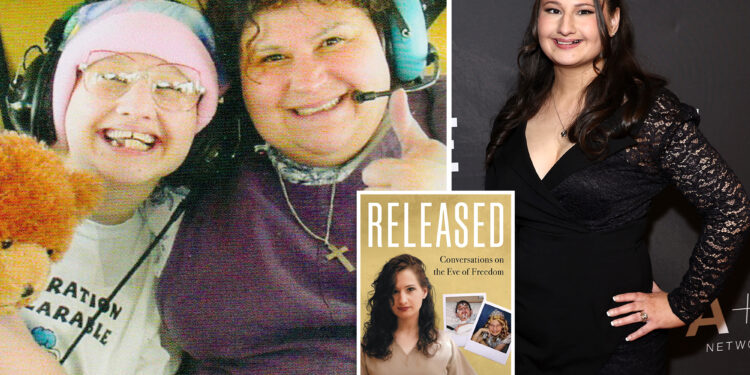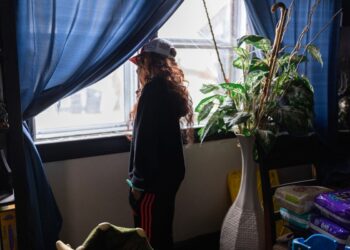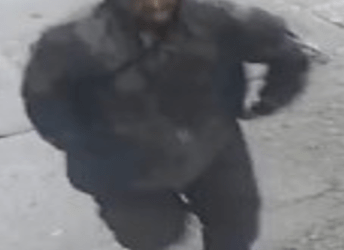
She’s free — to tell all.
Convict-turned-influencer Gypsy Rose Blanchard reveals her abusive past and time in prison via letters, phone transcripts and photos in her new e-book, “Released: Conversations on the Eve of Freedom,” out Tuesday.
The 32-year-old — who was released from a Missouri prison on Dec. 28 after serving seven years of a 10-year sentence for her role in the murder of her mother, Clauddine “Dee Dee” Blanchard, in 2015 — details alleged abuse by her mother and grandfather but says she is remorseful for her crime.
Blanchard also reveals a battle with opioid addiction while in prison — and claims she served a stint in solitary confinement after a super fan wanted to break her out.
“I want you to know that I know now you were mentally and emotionally unstable when raising me,” Blanchard says in an open letter to her mother, written from Chillicothe Correctional Facility in Missouri. “Fear, manipulation and isolation were all I knew of your kind of ‘love.’”
In the book, written with Melissa Moore, who interviewed Blanchard while she was in prison, and Michele Matrisciani, Blanchard recalls undergoing unnecessary surgical procedures as a result of her mother’s Munchausen by Proxy, in which a parent imagines or makes up a medical disorder for their child to get sympathy.
As a girl, Blanchard was confined to a wheelchair despite being able to walk, force-fed medications that “left my body marked with scars both physical and emotional,” and had her head shaved to fool the world into thinking she was sick with leukemia, muscular dystrophy and other illnesses.
Dee Dee, she writes, told her for years that she was terminally ill and had the mental capacity of a young child, depriving her of an education beyond first grade. Her fake illness was used to draw attention and gifts, including a Habitat for Humanity home and free trips to Disney World.
In June 2015, Dee Dee was stabbed to death by Nicholas Godejohn, Blanchard’s boyfriend who she met online. Godejohn is serving a life sentence in Missouri for the murder.
The headline-making case was the basis for HBO documentary “Mommy Dead and Dearest” and the Hulu scripted series “The Act.”
Here are the most shocking revaluations from Blanchard’s new book:
Harrowing abuse
Blanchard recalls her routine abuse, telling Moore in a prison phone call how her mother kept her trapped inside. When the girl once tried to confide in a man she’d met, Blanchard claimed, her mom tied her to a bed for two weeks as punishment.
“She used a dog leash to do it after she beat me,” Blanchard says in the book.
She also claims she was molested by her maternal grandfather Claude Pitre Sr. in 2001, after Dee Dee was in a car crash and the two lived with him for three months. Pitre has denied these allegations.
“I did have a memory from when I was 5 that I knew was odd. My grandfather drew a bath and made my mom and me bathe with him,” Blanchard says in the book. “My mother told me … he would take her into other rooms and continue the molesting. He denies it but he did those things to me too.”
“She was the one that was trying to touch me, and I’d say no, don’t do that,” Pitre says on camera in the documentary “The Prison Confessions of Gypsy Rose Blanchard,” on Lifetime. “She started doing that when she was about 4 years old.”
Groomed for crime, shoplifting as a child
Blanchard alleges that her mother taught her to shoplift, using her perceived disability as an advantage.
“Sitting in a wheelchair helps to more easily knock things into your lap and shove them under your princess dress,” she writes.
“My mother taught me the barcode swap: remove the barcode sticker from a cheaper item and place it on the more expensive one; then use the self-checkout lane.”
Opioid addiction behind bars
Blanchard admits to a battle with opioids — and that she once lied to her stepmom to get $50, saying she needed to repay a friend after breaking a CD player.
“I used the money to buy drugs,” she writes.
“About four or five years ago, I was addicted to Suboxone, [a medication to treat opioid addiction]. I succumbed to and overcame, then succumbed to again and overcame again … an opioid addiction.”
Solitary confinement because of a stranger
Blanchard alleges she was sent to solitary confinement for two weeks after a stranger’s social media post fueled an investigation.
She claims in the books that a fan said “something like, ‘She doesn’t belong in prison. I wish I could bust her out.’”
According to Blanchard, the post was reported to the prison.
“It was traumatizing,” she writes. “I was in there for a solid two weeks while they went through my stuff looking for writings or plans or any correspondence that indicated I knew the person who posted. Which I didn’t.”
Dee Dee’s divorce sparked years of isolation
In December 1990, Dee Dee met Blanchard’s biological father, Rod, at a bowling alley when he was 17 and she was 24. Blanchard was born seven months later in Louisiana, but her parents quickly split up and she seldom saw her father when they moved to Missouri.
“I know now my father just wasn’t in love with my mother, and she was bitter about him and men in general,” Blanchard writes.
She lost touch with her father by age 10, when Dee Dee took more control over her life and began lying about her age.
Isolated from friends and family, Blanchard details how her mother home-schooled her only up to a first-grade level of education — and how that stunted learning hurt her ability to form relationships.
“I didn’t know anything, except maybe a little addition and subtraction,” she told Moore from prison, where she eventually earned a high-school diploma.
Rod and his wife, Kristy, reconnected with his daughter during her prison sentence when they learned she was a victim of Dee Dee’s Munchausen by Proxy.
Finding love — and remorse
Blanchard met Ryan Anderson in 2020 when he wrote her a letter that sparked a years-long friendship and culminated with the duo getting married in July 2022 while she was still behind bars.
She says that having a diagnosis for her mother’s condition has helped her let go of resentments — feel sorry about the role she played in her mother’s death.
“Murder was never the answer or the solution,” Blanchard writes. “I will carry this regret and remorse with me for the rest of my life,” expressing she still carries her mother’s memory with her.
“Even though it doesn’t make sense, I miss her terribly.”



























